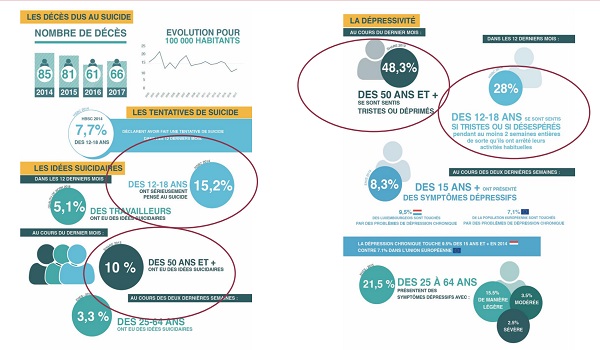 Credit: Itinere Conseil
Credit: Itinere Conseil
During a press conference on Tuesday, Luxembourg's Minister of Health Paulette Lenert presented the conclusions of the evaluation of the national plan for the prevention of suicide for Luxembourg 2015-2019.
As noted in the evaluation report, the strengths of the plan were the many actions aimed at the general public, from awareness campaigns and websites to mental health weeks, as well as the specific tools created for generalist sectors, for instance a school guide, a family guide and training programmes. It was recommended that these activities continue to be developed and that they increasingly target teachers and health professionals. These training courses should also be aimed at relatives and colleagues of at-risk groups in order to offer a benevolent framework for those suffering, detect the signs and refer them to help services.
Among the plan's weak points were sectors that are too often compartmentalised, both at the governance and operational level, and the difficulty of involving the general medicine sector, which is the first line of requesting help.
Health Minister Paulette Lenert explained: “There is no hierarchy between mental health and physical health". Consequently, the ministry intends to invest more in the quality of support in the event of suicidality. The central issue here is access to care, emergency services in hospitals, for example, which are not always adapted to needs, or waiting times.
Although this plan ended in 2019, some actions will continue. Of the 33 actions described in the plan, nineteen actions have been completed or are in the process of being implemented. Spotting the warning signs of suicidal crisis remains one of the priority objectives of the actions launched. Currently, more than 1,000 people have followed this training programme organised by the information and prevention centre of the Luxembourg League for Mental Health, in agreement with the Ministry of Health. A new action of continuity, which began during mental health week in autumn 2020, is the first aid training course for mental health. During this week, 120 people received training.
Minister Paulette Lenert recalled: "Everyone has an important role to play in suicide prevention, starting with health structures, schools, but also the business world and the community at large. It is by working together that we will succeed in saving lives".
This assessment of the national plan for the prevention of suicide demonstrated the importance of continuing and developing other transversal actions concerning the well-being of the population in order to avoid the triggers of a suicidal crisis (upstream). It is also a matter of focussing more on aspects of access to care and follow-up for people who are suffering (downstream). This is the reason why mental health will be one of the pillars of the national health strategy that will be developed and presented this year.
The full assessment of the national plan for the prevention of suicide 2015-2019 can be consulted via the health portal www.sante.lu.
This assessment was prepared by the independent consultant Véronique Louazel, in charge of public health studies at the Itinere Conseil in France.








